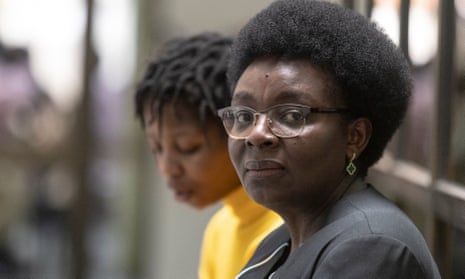A Rwandan opposition leader who has been banned from standing for election has cast doubt on whether her government will stick to the terms of the deportation deal agreed with Rishi Sunak.
Victoire Ingabire Umuhoza told the Guardian that the Rwandan government’s refusal to allow her to stand or leave the country to see her ill husband showed that the government under Paul Kagame did not adhere to international law.
On Tuesday, she launched a claim in the east African court of justice, saying she should be allowed to oppose the president in July’s general election.
In the UK, Sunak has been building towards operationalising plans to forcibly remove UK asylum seekers to Rwanda.
Umuhoza said: “The fact that I keep seeking justice in regional courts such as this one illustrates that anyone who dares or is perceived to challenge the Rwandan government can’t have fair justice in Rwanda.
“We must question the effectiveness of Rwanda’s judiciary system and the Rwandan government’s commitment to its international obligations, especially at this time it has entered into a controversial immigration partnership with the UK.”
Umuhoza has taken her case to the court in Arusha, Tanzania, in an attempt to oppose Kagame, the president since 2010 who has been accused of running a dictatorship. In the last election, he won 98.8% of the vote.
She was disqualified from running after spending eight years in jail after what human rights groups including Amnesty called a flawed trial. She had been found guilty of collaborating with a terrorist organisation and “minimising the genocide”.
The African court on human and peoples’ rights found there had been violations of her right to freedom of opinion and expression, as well as her right to defence.
Umuhoza was released in 2018 after receiving a pardon from Kagame. She spent five of her eight years in jail in solitary confinement.
She is asking the east African court to overturn a March ruling of the Rwandan high court that refused her application on the grounds that it determined that some conditions imposed on her release from prison in 2018 had still to be met.
In her claim, she said she had been jailed on trumped up charges after expressing opposition to Kagame and that these charges continue to be used to stop her from standing for election.
Umuhoza’s case also says that since 2010, she has been denied any opportunity to leave Rwanda to see her husband, who is gravely ill in Holland, or her children, despite multiple requests.
Kagame’s only known challenger in the July election is the Green party leader, Frank Habineza, who secured 0.45% of the vote in 2017. All other legally registered opposition parties back the ruling Rwandan Patriotic Front.
Umuhoza’s Dalfa Umurinzi (Development and Liberty for All) movement is not officially registered in Rwanda.
Numerous allies of Umuhoza have disappeared. she has claimed. They include Iragena Illuminée, a nurse who disappeared on her way to work, and Boniface Twagirimana, who disappeared while in prison.
A UK Home Office document released on Monday night raised serious questions about the safety of opposition politicians and journalists in Rwanda, days after the country was declared safe by parliament.
The report, an updated “country information note”, said opponents of the ruling Rwandan Patriotic Front (RPF) had been “forced into exile or assassinated” .
It referenced the findings of the Bertelsmann Stiftung’s Transformation Index (BTI), which highlighted the regime’s “strong authoritarian grip over the country”.
The BTI said: “Detractors, particularly those within circles of power, are not tolerated, and many have either been targeted and forced into exile or assassinated. Repression has also been aimed at other forms of opposition, specifically non-RPF political adversaries, journalists and civil society activists.”
“There is minimal space for power-sharing, genuine political diversity, an independent and thriving civil society or freedom of expression.”
The document also highlighted concerns by the US-based Freedom House that the opposition politician Venant Abayisenga was “forcibly disappeared or killed” after being cleared in a 2020 trial.
Human Rights Watch had documented 30 cases where activists and journalists had died, disappeared or been jailed from 2019 to 2022, the report said.
A Rwandan government spokesperson said: “Victoire Ingabire is neither an opposition leader nor a defender of democracy. She is an unrepentant criminal who was convicted of plotting to overthrow the government in collusion with violent militias based in the [Democratic Republic of the Congo, and attempting to reignite ethnic division in Rwanda. She also consistently lies about being held in ‘solitary confinement’, which does not exist in the Rwanda correctional facilities.
“Victoire Ingabire’s trial heard damning testimonies from her accomplices, and included overwhelming evidence of her guilt, part of which was provided by Dutch authorities.
“Thankfully the Rwandan justice system upheld the rule of law and disqualified her from standing for office. In countries around the world, including in the UK, criminals are not allowed to run for office, Rwanda is no different.”
